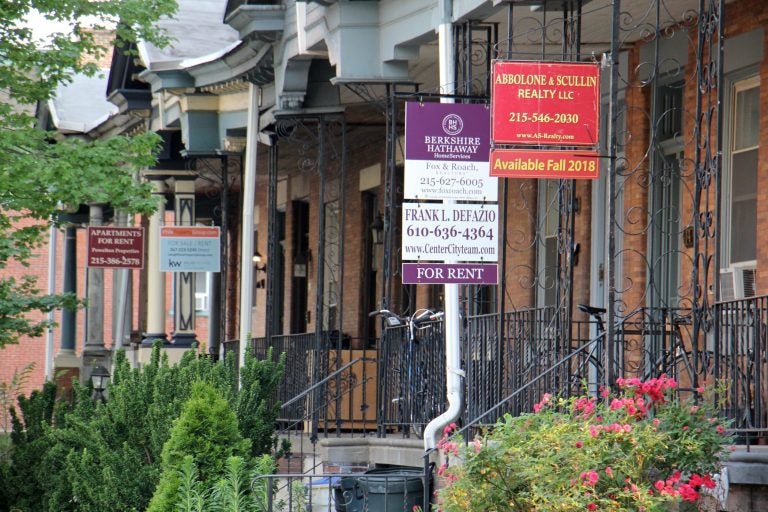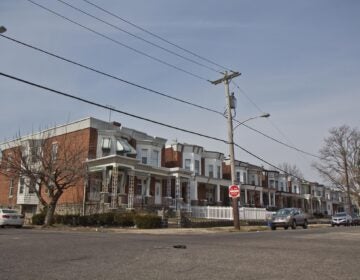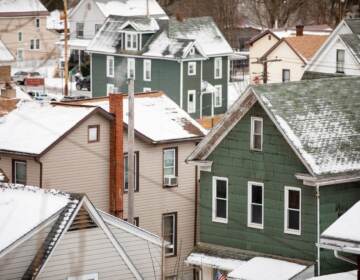CDC extends eviction ban through June as 30% of Pa. households fall behind on rent
While tenants and advocates for vulnerable populations applaud the move, some local landlords and their representatives are challenging it.

File photo: Rowhomes at 34th and Spring Garden streets for sale or rent. (Emma Lee/WHYY)
The Center for Disease Control and Prevention has extended a nationwide ban on evictions through June. Before Monday’s announcement, the hold on lockups was due to expire in two days.
“The COVID-19 pandemic has presented a historic threat to the nation’s public health,” CDC director Dr. Rochelle Walensky said in a statement. “Keeping people in their homes and out of crowded or congregate settings — like homeless shelters — by preventing evictions is a key step in helping to stop the spread of COVID-19.”
But while tenants and advocates for vulnerable populations applaud the move, some local landlords and their representatives are challenging it.
Spokesperson Andre Del Valle from the Pennsylvania Apartment Association said the news comes as a blow to the group.
“While landlords continue to struggle to find ways to pay their mortgages, the tenant continues to fall deeper in arrears potentially hurting their future credit and housing opportunities with backed payments and an eviction on their records due to non-payment when the moratorium is eventually lifted,” Del Valle said.
The CDC order applies only to evictions for nonpayment — evictions for other lease violations are allowed. First put in place when the pandemic began last year, the moratorium has been extended multiple times. Most recently, Congress extended it in December and then the President Joe Biden administration pushed it again till March 31.
Under CDC rules, renters have to certify to their landlords that they are unable to pay their rent because of pandemic-related hardships. Renters also must say they attempted getting government rental assistance to make payments. This applies to people who earn $99,000 or less or couples filing jointly who make $198,000 or less.
The order does not stop landlords from filing court cases and it does not stop rent from accruing. It prevents lockouts.
Nearly one third of adults in the Philadelphia region and across Pennsylvania are living in households that have fallen behind on rent or mortgage payments and where eviction or foreclosure is either very likely or somewhat likely according to the Census Bureau’s Household Pulse Survey.
Biden’s American Rescue plan passed earlier this month includes $21.5 billion for rental assistance. This is on top of rent relief in the last federal coronavirus aid package passed in December which brings up the total aid to about $45 billion.
On the local level, Philadelphia’s next phase of rental assistance will go live by Wednesday. Philadelphia is expecting $97 million in federal aid for assistance.
Greg Heller, Philadelphia Housing Development Corp. senior vice president of community investment, said the CDC moratorium will help maintain stability in communities like Philadelphia.
“It was the right thing for the federal government to extend the eviction moratorium,” Heller said. Cities and counties need time to get this emergency rental assistance into the hands of landlords and tenants. In the meantime, it’s critical to keep families in their homes.”
Holly Beck, a housing attorney at Community Legal Services, agreed this was a victory for tenants and public health.
“We’re still in the middle of a pandemic,” Beck said. “People still need protection from COVID-19 and what this extension will do is give people more time to get the vaccine and apply for new rental assistance.”
Meanwhile, the legal counsel of landlord group HAPCO, Paul Cohen, sees the CDC move as unconstitutional.
At least two federal judges have challenged the CDC order on that basis, one in Texas and another in Ohio.
“This shouldn’t be coming from the CDC, this should be from the legislature,” Cohen said. “If Congress wanted to extend this, Congress has the ability to do that. The CDC, in my opinion, does not have the authority to do that.”
 WHYY is one of over 20 news organizations producing Broke in Philly, a collaborative reporting project on solutions to poverty and the city’s push towards economic justice. Follow us at @BrokeInPhilly.
WHYY is one of over 20 news organizations producing Broke in Philly, a collaborative reporting project on solutions to poverty and the city’s push towards economic justice. Follow us at @BrokeInPhilly.

Subscribe to PlanPhilly
WHYY is your source for fact-based, in-depth journalism and information. As a nonprofit organization, we rely on financial support from readers like you. Please give today.






![CoronavirusPandemic_1024x512[1]](https://whyy.org/wp-content/uploads/2020/03/CoronavirusPandemic_1024x5121-300x150.jpg)



